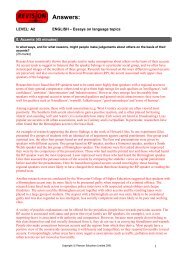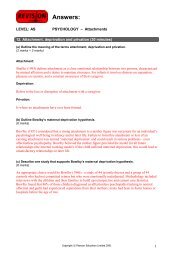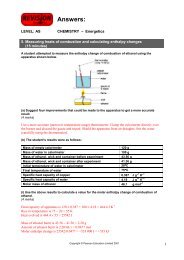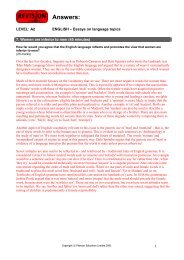The Dove Campaign for Real Beauty - Pearson
The Dove Campaign for Real Beauty - Pearson
The Dove Campaign for Real Beauty - Pearson
You also want an ePaper? Increase the reach of your titles
YUMPU automatically turns print PDFs into web optimized ePapers that Google loves.
Chapter 2 Sustainable marketing: marketing ethics and social responsibilityseveral remedies available, including contacting the company or the media, contacting governmentor private consumer-interest/protection bodies or agencies, going to small-claims courts, ororganising consumer boycotts.Thomas Clarkson, a founder of the Society <strong>for</strong> Effecting the Abolition of Slavery in 1787,organised what was probably the first ever consumer boycott. It was against slave-grownsugar and aimed to bring home to Britons that they were paying a dreadful price in humancruelty <strong>for</strong> indulging a sweet tooth. At one time more than 300,000 people joined the boycott thatwas also designed to hit the profits of the plantation owners. It inspired a parliamentarymovement against slavery, recruiting William Wilber<strong>for</strong>ce, who brought bills be<strong>for</strong>e Parliament toabolish the slave trade until one was passed in 1807.Over 200 years later Nike faced an anti-sweatshop protest. <strong>The</strong>y initially denied responsibilityat contractors’ factories, but subsequently became a leader in an attempt to establishindependent factory monitoring and promote labour rights, including the freedom <strong>for</strong> its 800,000workers worldwide to <strong>for</strong>m and join trade unions. Other companies, including Reebok and LeviStrauss, have since followed Nike’s lead. 27<strong>The</strong> advent of electronic communication has made it possible <strong>for</strong> consumers to gain masssupport and time their intervention powerfully. So powerful can these movements be thatcompanies have rated reputation loss as the greatest risk they face. 28EnvironmentalismWhereas consumerists consider whether the marketing system is efficiently serving consumerwants, environmentalists are concerned with marketing’s effects on the environment and thecosts of serving consumer needs and wants. Environmentalism is an organised movement ofconcerned citizens and government agencies to protect and improve people’s living environment.Environmentalists are not against marketing and consumption; they simply want people andorganisations to operate with more care <strong>for</strong> the environment. <strong>The</strong>y assert that the marketingsystem’s goal is not to maximise consumption, consumer choice or consumer satisfaction, butrather to maximise life quality. ‘Life quality’ means not only the quantity and quality ofconsumer goods and services, but also the quality of the environment. Environmentalists wantenvironmental costs to be included in both producer and consumer decision making.<strong>The</strong> first wave of modern environmentalism was driven by fringe environmental groups, suchas Greenpeace, and concerned consumers in the 1960s and 1970s. <strong>The</strong>y were concerned withdamage to the ecosystem caused by strip mining, <strong>for</strong>est depletion, acid rain, loss of the atmosphere’sozone layer, toxic wastes, whaling and landfills. <strong>The</strong>y were also concerned with the loss ofrecreational areas and with the increase in health problems caused by bad air, polluted water andchemically treated food.<strong>The</strong> second wave was driven by governments, which passed laws and regulations during the1970s and 1980s governing industrial practices impacting the environment. This wave hit someindustries hard. Chemical and steel companies and utilities had to invest in pollution-controlequipment and costlier (but cleaner) fuels. <strong>The</strong> car industry had to introduce expensive emissioncontrols in cars. <strong>The</strong> packaging industry has had to find ways to reduce litter. <strong>The</strong>se industriesand others have often resented and resisted environmental regulations, especially when they havebeen imposed too rapidly to allow companies to make proper adjustments. Many of thesecompanies claim they have had to absorb large costs that have made them less competitive.Environmentalism—Anorganised movement ofconcerned citizens andgovernment agencies toprotect and improvepeople’s livingenvironment.87
















